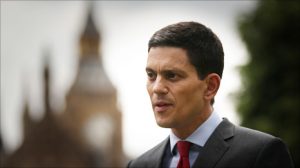Global political turmoil bad news for refugees
Refugees around the world have been caught up in global socio-political turmoil and local polarised politics is threatening to make their situation worse, according to the head of the International Rescue Committee (IRC) and former British Foreign Secretary David Miliband.
In a recent speech at Princeton University in the US, Mr Milliband said humanity was facing fundamental social and political change and that refugees could become the biggest losers under a new paradigm.
He said the plight of refugees has grown into a global epidemic, spurred by deep societal changes.

David Miliband
“There is a threat or fundamental change to the architecture and assumptions undergirding international relations through my lifetime,” Mr Milliband said.
“I think we’re at a moment that historians will come to consider really crucial, way beyond whether or not there’s a change in these assumptions,” he said.
And he said global shifts in political trends are the root sources of this pivotal moment.
“The political crisis frames everything, including the refugee crisis, which is a symptom but also, to some extent, a cause of some of the juddering political changes you see in the UK and also in the US,” he said.
“This debate, sometimes about populism, about societal divides or restricted democracy, is part of a wide syndrome of fragmentation and upheaval,” Mr Miliband said.
“The Eurasia group has forecast a geopolitical repression with the danger of a geopolitical depression. And I would argue that it’s really the case that globalisation over the last decades has been too unequal, too unstable, and too insecure for it to have much good,” he said.
Mr Miliband identified a new emerging conflict between political and economic goals as the core source of international disruption.
“Politics and economics are indeed tearing each other apart,” he said.
“The global economy is boosted by high levels of migration, but local politics, mostly at the request of societies, are being torn apart by debates on immigration.
“Global economics is stabilized by international economic cooperation and support by nations on sharing, but local politics, on that sharing, is very resistant,” Mr Miliband said.
He said many politicians were also opposed to international trade and that we may be facing the end of what he termed a ‘post second-world war era’; a time period in which Western nations largely collaborated toward common goals.
“This isn’t just about Post-Cold War era, it’s about post-war era. The Cold War was fought to break down walls; the West after World War II stood for a declaration not of independence but of interdependence,” Mr Miliband said.
“The West associated universal values, not just Western ones, and argued that injustice or oppression anywhere was a threat to justice and freedom everywhere. And it’s those assumptions that I would argue are now under question.”
He said all of these issues were “directly and negatively” affecting refugees.
“Refugees are caught between the forces of global interconnectedness and political contraction,” he said.
Mr Miliband said the global refugee crisis could be characterised in five key ways.
“First, that the mismatch between need and provision for refugees and displaced people has never been greater,” he said.
“Let me start with the scale of the crisis,” he said.
He cited the figure of 65 million refugees who are forced migrants, not economic migrants seeking better opportunities.
“Few are willing or even able to return to their homes, which are ravaged by war or instability. Many are internal refugees — people who are displaced from their homes but remain within their country’s borders,” Mr Miliband said.
“The word crisis, I’m sure, is overused, but my goodness this is a crisis,” he said.
Secondly, he cautioned against the proliferation of myths revolving refugees and urged the audience to focus on the facts.
“We need to break free of fictions that undermine the situation. For instance, it’s a fiction that wealthy countries like the United States host the majority of refugees. They don’t,” he said.
Thirdly, he said, refugee resettlement is part of the solution. He described how Turkey had built refugee camps meant to hold 217,000 migrants; there are now over 2 million registered Syrian refugees living in Turkey, with many more likely undocumented.
Mr Miliband said this demonstrated the importance of integrating refugees into cities and communities.
Fourthly, he also advocated for greater reform in the economics of refugee aid — not just increased contributions — but a more effective allocation of resources.
“We need to reform humanitarian need and build a model of economic, not just social support. More money alone is not enough to solve the crisis. We have to think about the kind of help we’re providing, where we’re providing it, and how,” Mr Miliband said.
Finally, he said that Western countries’ treatment of refugees will dictate their social values in the years to come.
“If we do these things I argue, we will express the important values of our own societies,” he said.
“The work of the IRC is not only about ‘them,’ it’s also about ‘us,” Mr Miliband said.
The International Rescue Committee was founded by Albert Einstein in 1933 in response to Hitler’s regime. Since its inception 83 years ago, the IRC has grown into one of the world’s largest refugee aid organisations.
The IRC operates in more than 40 war-affected countries and its runs refugee resettlement and assistance programs in 26 United States cities.
Laurie Nowell
AMES Australia Senior Journalist












